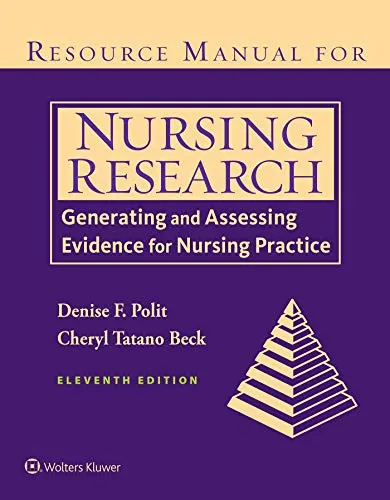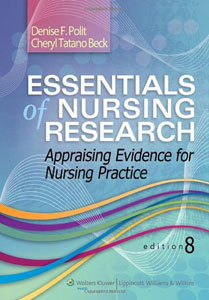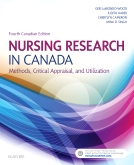In Stock
Nursing Research Generating and Assessing Evidence for Nursing Practice 11th Edition Test Bank
$55.00 Original price was: $55.00.$23.50Current price is: $23.50.
Digital item No Waiting Time Instant Download
Chapters: 54
Format: PDF
ISBN-13: 978-1975112264
ISBN-10: 1975112261
Publisher: LWW
Authors: Denise Polit, Cheryl Beck
SKU: 000786000600
Category: NURSING
Description
Nursing Research Generating and Assessing Evidence for Nursing Practice 11th Edition Test Bank
Table of Contents
Chapter 1 Introduction to Nursing Research in an Evidence-Based Practice Environment
Chapter 2 Evidence-Based Nursing: Translating Research Evidence into Practice
Chapter 3 Key Concepts and Steps in Qualitative and Quantitative Research
Chapter 4 Research Problems, Research Questions, and Hypotheses
Chapter 5 Literature Reviews: Finding and Critiquing Evidence
Chapter 6 Theoretical Frameworks
Chapter 7 Ethics in Nursing Research
Chapter 8 Planning a Nursing Study
Chapter 9 Quantitative Research Design
Chapter 10 Rigor and Validity in Quantitative Research
Chapter 11 Specific Types of Quantitative Research
Chapter 12 Sampling in Quantitative Research
Chapter 13 Data Collection in Quantitative Research
Chapter 14 Measurement and Data Quality
Chapter 15 Developing and Testing Self-Report Scales
Chapter 16 Descriptive Statistics
Chapter 17 Inferential Statistics
Chapter 18 Multivariate Statistics
Chapter 19 Processes of Quantitative Data Analysis
Chapter 20 Clinical Significance and Interpretation of Quantitative Results
Chapter 21 Qualitative Research Design and Approaches
Chapter 22 Sampling in Qualitative Research
Chapter 23 Data Collection in Qualitative Research
Chapter 24 Qualitative Data Analysis
Chapter 25 Trustworthiness and Integrity in Qualitative Research
Chapter 26 Basics of Mixed Methods Research
Chapter 27 Developing Complex Nursing Interventions Using Mixed Methods Research
Chapter 28 Feasibility Assessments and Pilot Tests of Interventions Using Mixed Methods
Chapter 29 Systematic Reviews of Research Evidence: Meta-Analysis, Metasynthesis, and Mixed Studies Review
Chapter 30 Disseminating Evidence: Reporting Research Findings
Chapter 31 Writing Proposals to Generate Evidence
Nursing Research Generating and Assessing Evidence for Nursing Practice 11th Edition Polit Beck Test Bank
Chapter 1 Introduction to Nursing Research in an Evidence-Based Practice Environment
1.
What is the highest priority for the
importance of research in the nursing
profession?
A) Research findings provide evidence for
informing nurses’ decisions and actions.
B) Conduct research to better understand the
context of nursing practice.
C) Document the role that nurses serve in
society.
D) Establish nursing research areas of study.
2. Which group would be best served by
clinical nursing research?
A) Nursing administrators
B) Practicing nurses
C) Nurses’ clients
D) Healthcare policymakers
3. In the United States, in what area does
research play an important role in nursing?
A) Chronic illness
B) Credentialing and status
C) Nurses’ personalities
D) Nurses’ education
prepthenurse.com prepthenurse.com
4. What is the role of a consumer of nursing
research?
A) Read research reports for relevant
findings.
B) Participate in generating evidence by
doing research.
C) Participate in journal club in a practice
setting.
D) Solve clinical problems and make clinical
decisions.
5. What was the concern of most nursing
studies in the early 1900s?
A) Client satisfaction
B) Clinical problems
C) Health promotion
D) Nursing education
6.
Which topic most closely conforms to the
priorities that have been suggested for
future nursing research?
A) Attitudes of nursing students toward
smoking.
B) Promotion of excellence in nursing
science.
C) Nursing staff morale and turnover.
D) Number of doctorate prepared nurses in
various clinical specialties.
prepthenurse.com prepthenurse.com
7. What is the process of deductive
reasoning?
A) Verifying assumptions that are part of our
heritage.
B) Developing specific predictions from
general principles.
C) Empirically testing observations that are
made known through our senses.
D) Forming generalizations from specific
observations.
8. What is the ontological assumption of
those espousing a naturalistic paradigm?
A) Objective reality and those natural
phenomena are regular and orderly.
B) Phenomena are not haphazard and result
from prior causes.
C) Reality is multiply constructed and
multiply interpreted by humans.
D) Reality is not fixed, but is rather a
construction of human minds.
9. What is the epistemological assumption of
those espousing a positivist paradigm?
A) The researcher is objective and
independent of those being studied.
B) Phenomena are not haphazard, but rather
have antecedent causes.
C)
The researcher instructs those being
studied to be obj
What is the highest priority for the
importance of research in the nursing
profession?
A) Research findings provide evidence for
informing nurses’ decisions and actions.
B) Conduct research to better understand the
context of nursing practice.
C) Document the role that nurses serve in
society.
D) Establish nursing research areas of study.
2. Which group would be best served by
clinical nursing research?
A) Nursing administrators
B) Practicing nurses
C) Nurses’ clients
D) Healthcare policymakers
3. In the United States, in what area does
research play an important role in nursing?
A) Chronic illness
B) Credentialing and status
C) Nurses’ personalities
D) Nurses’ education
prepthenurse.com prepthenurse.com
4. What is the role of a consumer of nursing
research?
A) Read research reports for relevant
findings.
B) Participate in generating evidence by
doing research.
C) Participate in journal club in a practice
setting.
D) Solve clinical problems and make clinical
decisions.
5. What was the concern of most nursing
studies in the early 1900s?
A) Client satisfaction
B) Clinical problems
C) Health promotion
D) Nursing education
6.
Which topic most closely conforms to the
priorities that have been suggested for
future nursing research?
A) Attitudes of nursing students toward
smoking.
B) Promotion of excellence in nursing
science.
C) Nursing staff morale and turnover.
D) Number of doctorate prepared nurses in
various clinical specialties.
prepthenurse.com prepthenurse.com
7. What is the process of deductive
reasoning?
A) Verifying assumptions that are part of our
heritage.
B) Developing specific predictions from
general principles.
C) Empirically testing observations that are
made known through our senses.
D) Forming generalizations from specific
observations.
8. What is the ontological assumption of
those espousing a naturalistic paradigm?
A) Objective reality and those natural
phenomena are regular and orderly.
B) Phenomena are not haphazard and result
from prior causes.
C) Reality is multiply constructed and
multiply interpreted by humans.
D) Reality is not fixed, but is rather a
construction of human minds.
9. What is the epistemological assumption of
those espousing a positivist paradigm?
A) The researcher is objective and
independent of those being studied.
B) Phenomena are not haphazard, but rather
have antecedent causes.
C)
The researcher instructs those being
studied to be obj





Be the first to review “Nursing Research Generating and Assessing Evidence for Nursing Practice 11th Edition Test Bank”